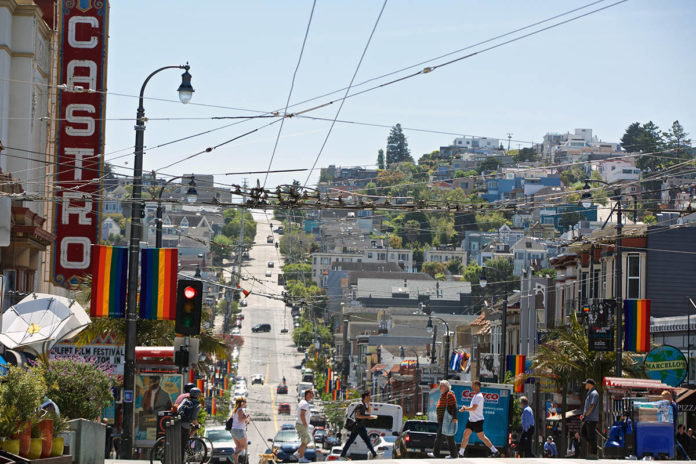Crime-fighting camera networks are springing up in commercial areas all around San Francisco. But public opinion toward the practice could be shifting following revelations last summer that one such video network in Union Square became a tool of police surveillance.
Just take a look at the vote this week from a property owner group that turned down a nearly $700,000 donation to set up a centralized surveillance camera system in the Castro, said Matthew Guariglia, a privacy advocate with the Electronic Frontier Foundation.
“I think Castro might be a line in the sand where the tide begins to turn, so to speak,” Guariglia said. “Even though each neighborhood is its own microcosm with its own political priorities, we might begin to see pushback all over The City toward this type of surveillance.”
Facing privacy concerns from LGBTQ groups, the Castro-Upper Market Community Benefit District became the first of its kind Monday to reject a proposed camera network like the ones already rolled out in Union Square, Fisherman’s Wharf and other areas.
The proposal would have called for installing cameras at crime hot spots along Market Street with funding from Ripple founder Chris Larsen, the same tech investor who is paying for camera networks in other parts of The City in an effort to make San Francisco safer.
The idea is to set up cameras that are connected to the same system, rather than standalone devices owned by individual shopkeepers or homeowners, so that police can easily access the footage upon request after a crime occurs in the area.
The networks are being run by special assessment districts, known as community benefit districts or business improvement districts, that collect fees from local property and business owners to make public safety and quality-of-life improvements in their areas.
The Castro vote is the first to come since privacy advocates made the troubling revelation that San Francisco police gained direct, live access to the Union Square cameras last May and June, as looting unfolded during civil unrest over the Minneapolis police killing of George Floyd.
Privacy advocates worried the cameras could have a chilling effect on First Amendment activities if used to monitor protests or even events like the Pride Parade, as The Examiner later revealed.
But whether the Castro vote is more than a one-off has yet to be seen.
Castro CBD head Andrea Aiello acknowledged that the controversy from last summer played a “huge” role in the opposition to her proposal. Despite the uproar, Aiello said other neighborhood groups have still reached out to her expressing interest in installing their own networks.
“I think it’s an anomaly in the Castro,” said Aiello. “After the town hall I received emails from merchants associations asking me, ‘Oh, we heard about the camera program. Can you connect me to Chris Larsen?’”
Some of the privacy issues facing the proposal were indeed unique to the historically LGBTQ neighborhood. While Aiello drafted strict privacy guidelines, one group worried the cameras threatened to expose members of the LGBTQ community visiting from communities that are hostile toward gay rights.
But she said the issue that finally did in her proposal, on top of everything else, was a cost projection estimating the cameras would cost about $87,000 a year to maintain once grant funding from Larsen expired.
Tom Ostly, a former San Francisco prosecutor and camera proponent, also viewed the decision as being more about the Castro than The City, as a whole. Some opponents didn’t trust the camera program because of the past abuses by San Francisco police toward the gay community.
“There were some very Castro-specific arguments being made,” Ostly said.
Ostly said he hopes to see the camera networks expand to other neighborhoods, with proper safeguards for transparency and accountability. He argues the cameras are not only useful for solving and prosecuting crimes, but acquitting those who would otherwise be charged.
He pushed back on any notion that authorities would use the cameras to target protesters.
“Not only is there no interest in it, there are actual crimes being committed so the idea of wasting your time because you don’t like someone’s political views, that wouldn’t fly,” Ostly said. “I can’t imagine that would happen.”
The ACLU and EFF have filed a lawsuit against police for obtaining live access to the Union Square cameras. The group argues that police violated a law prohibiting officials from acquiring new surveillance technology without prior approval from the Board of Supervisors.
Police have said they accessed the cameras under an exception to the law that allows for use of new technology under exigent circumstances. But part of the issue is that police had more access to the cameras than previously understood.
The Examiner has reported that police not only gained real-time access to the Union Square Business Improvement District cameras last summer, but in preparation for the Fourth of July holiday, Super Bowl and 2019 Pride Parade.
Guariglia said those revelations should make special assessment district strengthen their policies.
“The extenuating circumstances which people envisioned police approaching them for use of their cameras, like a lion wandering around Fisherman’s Wharf, actually doesn’t look like a lion wandering around Fisherman’s Wharf,” Guariglia said. “It looks like a Super Bowl Parade.”
Aiello offered her advice to neighborhood groups considering camera networks in the future. She said her group may have been the only one that surveyed the community for input before moving forward with a camera program.
“Every neighborhood is different, that’s why we are all independently controlled by our own board of directors,” Aiello said. “I would just encourage people to have strong controls and make sure they know their neighborhood.”
mbarba@sfexaminer.com
Bay Area NewsCrimesan francisco news
Find out more at www.sfexaminer.com/join/









